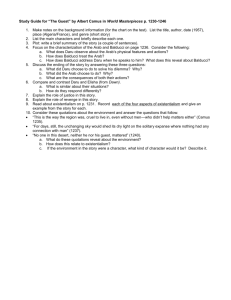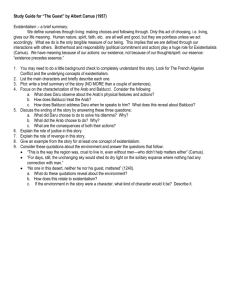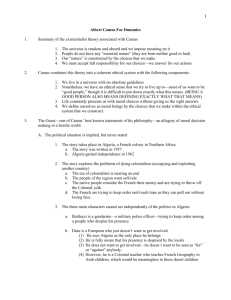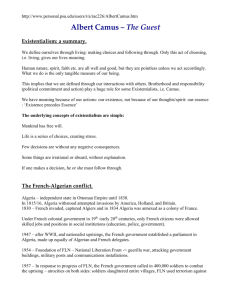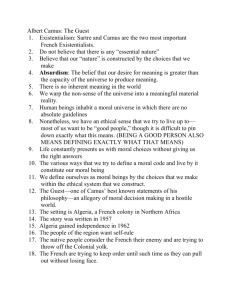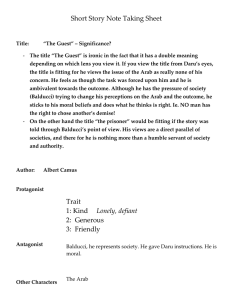Short Story - Mohamed Jaafar AlSamahiji
advertisement
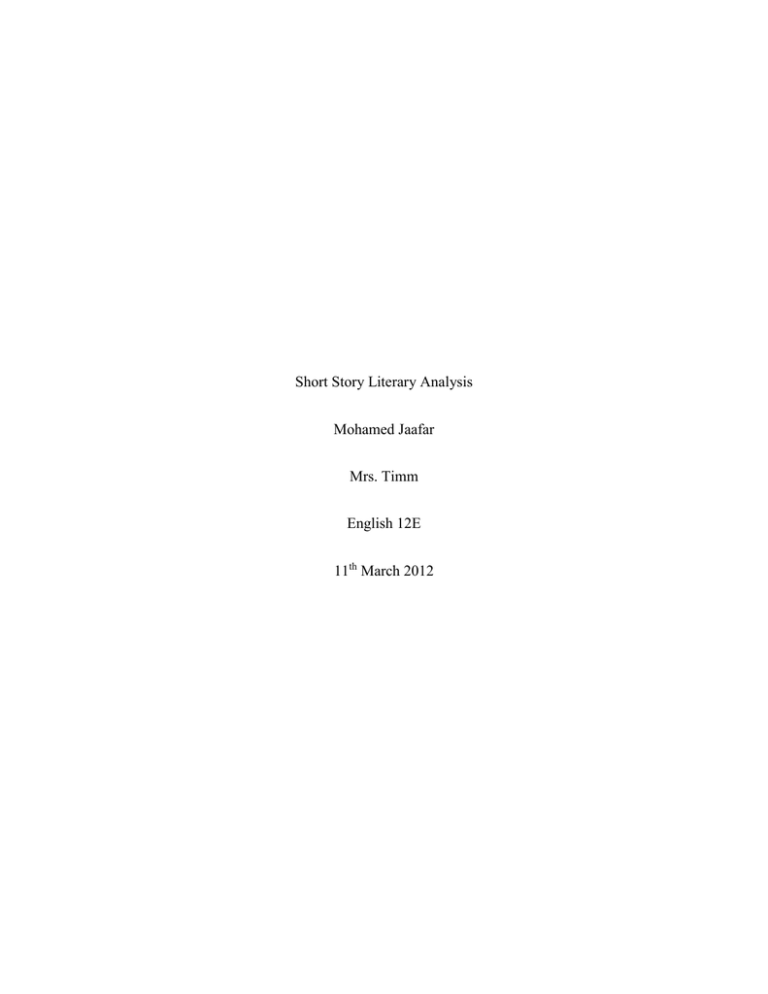
Short Story Literary Analysis Mohamed Jaafar Mrs. Timm English 12E 11th March 2012 Short Story Literary Analysis Outline I. Introduction A. Quote B. Explain C. Story D. Sentence summarizing the story E. Thesis Statement II. Setting A. When & where B. Quote a setting C. Why III. Plot A. Introduction B. Rising action C. Climax D. Falling action E. Resolution IV. Character A. Static character B. Dynamic character V. Point of view A. Third person B. Omnipresent VI. Theme A. Explain, example and why B. Explain, example and why C. Explain, example and why VII. Conflict VIII. Conclusion Mohamed Jaafar Mrs. Timm English 12E 11th March 2012 Short Story Literary Analysis “No, be quiet. Now I’m leaving you”. These were the last words said to the Arab by Daru. Daru was a school teacher who was given a choice Balducci to deliver a prisoner to Tinguit, or to set him free. The previous actions existed in a short story known as “The Guest” written by Albert Camus. In this short story, Daru faces a conflict with himself about delivering the prisoner or setting him free. Although Daru was expected to deliver the prisoner until Tinguit, he treated him as a guest and decided to set him free. The events of this story took place in the North African Country Algeria at the year 1954. By this time, a war has begun for independence from the French. “In wartime people do all kinds of jobs”. The previous words said by Balducci prove that the story’s setting was during a war, which is probably the independence war from the French. “The schoolmaster was watching the two men climb towards him”. This short story was introduced with the school teacher Daru watching two men climbing towards the school house, which was the place where he lived. One was on horseback, the other on foot, which made Daru wonder for the reason of their visit. “You’ll deliver this fellow to Tinguit. He is expected at the police headquarters”. The rising action began when Balducci expected Daru to deliver the Arab to the police office without any objection. As a matter of fact, Balducci gave Daru not any reason to object for, as Daru seemed like to be forced to deliver the prisoner against his will. “Are you hungry?”At the climax, as Arabs are not known for mistreating their guest, Daru treated the prisoner as a guest since the journey began. He offered him a blanket, a cot to sleep on and allowed him to eat at the table with him. But although the Arab was well treated by Daru, he still tried to escape as he knew that he would be sentenced for execution. “There are dates, bread and sugar. You can hold out for two days. Here are thousand francs too”. The falling action appeared when Daru decided to set the Arab free. Although Daru offered the Arab two choices which were either to reach Tinguit by himself or the pasturelands, he knew that the Arab would not walk to death. He already knew that he would go for the second choice. “There was no longer anyone on the hill”. This event is considered at the resolution of this short story as Daru left the prisoner alone on the hill and decided to turn backwards to his school, and his beloved students. This short story had two types of characters. First was the dynamic character who is Daru. Daru is presented as a dynamic character as he changed through the short story. He broke his words and decided to set the Arab free for many expected reasons. The other type of character is the static character which presents the Arab. The Arab is considered as a static character as he was running away from justice. He decided to escape from justice for the second time when Daru offered to set him free too. The reader’s point of view towards Daru’s decision of setting the Arab free may vary. But they would definitely agree that Daru have not any intentions to be responsible of an execution of any human being. He knew that the Arab would continue living if he set him free, but die when he delivers him to Tinguit police headquarters. Daru simply could not accept the idea of being responsible of executing a human being. The guest is a short story that holds a lot of themes within it. The first theme within this short story is freedom. Freedom was presented by Daru when he set the Arab free. It shows that all human beings have the right to be free. Another theme would be the decisions taken by the human beings and their consequences. These decisions may change a human being from being an entire criminal to a priest, or vice versa. This theme was also shown by Daru when his decision of setting the Arab free was thought to be a good one, as it would lead to positive consequences on the Arab. Another theme that can be extracted from this short story is dependence on faith to make the right decisions exist instead of depending on us. This theme was also presented by Daru when he did not want to be the responsible of executing a human being. He set him free and submitted the Arab to the faith, as he believed that faith would have a better choice. Although Daru did not want to deliver the Arab in the first place, he seemed like to be forced to accept this mission by Balducci. Apparently, Daru felt pity for the Arab and therefore he treated him well. He did not want to deliver the Arab into his final resting place. He had a self conflict whether to set him free or not. But when he was close to Tinguit, he knew that he could not stand the execution of this prisoner and therefore set him free. Although Daru could deliver the Arab to the police headquarters, he hesitated. His hesitation finally led to set the Arab free. Daru’s human behavior did not allow him to have a hand in executing a person, no matter was his crime.
